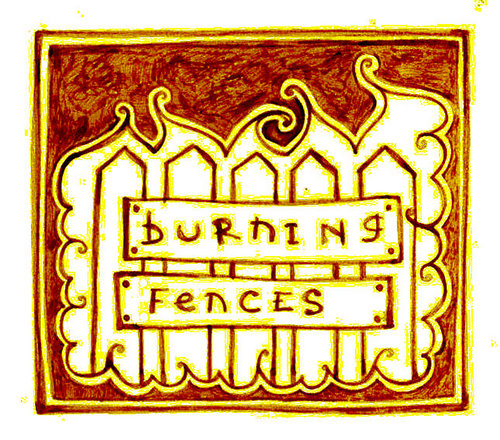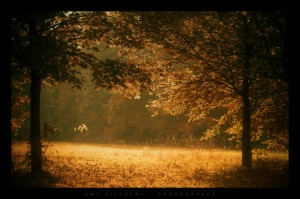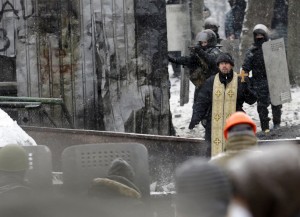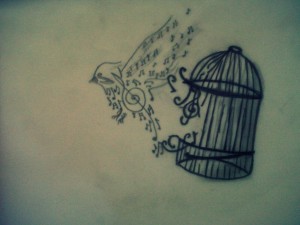Back in 2012 I came across a gathering of people known as ‘Burning Fences’. It was a community (of sorts) that had come together through open mic nights in York and all of the participants/‘members’ were curious about faith, philosophy and art. A year after encountering this collective, and very much identifying myself as part of it, I wrote a reflection on my experience in a post called ‘Fleeing to No-Man’s Land’. In this reflection I spoke idealistically about the desire to be ‘organic’ and to refute the need for definition and boundary. This was 2014 and we were still in the first wave of the re-emergent deconstructionist movement that has now morphed into post-liberalism with all its uncertainty, linguistic quagmires and frustrations.
A mere four months later I wrote again about this community in a post called ‘Struggling with No-Man’s Land’. The title was deliberate and the post speaks of the experience of struggle with living into the initial dream and ideal which we longed to exist. I had, over four months, inevitably fallen or arrived at the trap or reality (depending on where you stood) that comes from these types of dreams. I encourage you to read this second post particularly as it gives a foundation to what I feel called to reflect on this month: that is, ‘contested space’.
I do not have space to regurgitate John Milbank’s and Rowan Williams’ profound explorations of the ‘public sphere’ wholesale and, again, I can only encourage you, dear reader, to read for yourself ‘Theology and Social Theory’ and ‘Faith in the Public Square’ as two better articulations of what I am re-examining in my role here in Bradford. These two books and the authors’ wider work have been much on my mind as I have faced some curious forces as I move around in public life.
Back in October when I was interviewed for my new role I was asked to preach a short homily on the day’s gospel reading: Luke 14:12-14. This short teaching of Jesus on the subject of acceptable behaviour in social settings is set within a scene of pure hospitality. The teaching seems pretty clear, “When this happens; do this. When the other thing happens; do this other thing.” Rules of etiquette clearly put down to abide by and do good. As I was interviewing to be the Canon for Intercultural Mission this seemed particularly pertinent as the role would require me to navigate complex cultural spaces. Bradford Cathedral also celebrates its value of hospitality and is proud of its welcome of people of all faiths and none in a multi-cultural city. A passage about hospitality in a place of hospitality for a role focussed on hospitality; what a gift!
I ended up reflecting on the overuse of ‘welcome’ and ‘hospitality’ in community identity. What do we mean by ‘welcome’? How do we express or judge ‘hospitality’? In the passage the ‘hosts’ are crticised by Jesus and then the ‘guests’. It seems that the culturally agreed system of manners and customs were wrong to Jesus. Most churches would want to be welcoming to all and yet many of them, despite their expressed aims, are judged to be unwelcoming, particularly to certain groups. People express an experience of feeling unwanted, ignored or, even worse, demonised. How does our desire to welcome go so badly wrong? How do we defend ourselves from being ‘unwelcoming’? Is it possible that those offering hospitality have a conflicting understanding of welcome to those who are looking to receive it from them? And who decides, anyway, what is culturally acceptable behaviour and polite?
The reality is that we work on the assumption that we all agree on what makes for good hospitality and welcome. My friend, Russ, came over to my house early on in our friendship. I welcomed him in and said, “Make yourself at home.” He and his wife sat on our sofa and we chatted. About half an hour passed by and Russ suddenly said, “Did I just hear the kettle go?” A more passive aggressive question I have not heard! His point though was made: I had not offered him a cup of tea nor had I made it for him. In my mind I had not been rude for I had stated, as he came into my home, that it was his home. If it was his home he would make himself a cup of tea if he wanted one. We had different expectations of what a welcome is. The same is true in community life and, indeed, in public life.
This is where my reflections on Burning Fences comes into focus. With any social encounter there are underlying power dynamics at work and different cultures negotiate that exchange in different ways. I am reminded of the HSBC advert some years ago where they promoted their banking services on the premise that they understood the cultural nuances and distinctives across the globe. This negotiation is the work of intercultural mission. We must be clear as to what we mean by hospitality, how to express it and what to do when that conflicts with a different cultural paradigm. This, however, has become so complex it might be now rendered impossible without causing offence. No man’s land can only ever be temporary before one side advances and colonises it. It is, as anarchist Hakim Bey once called it, a Temporary Autonomous Zone.
At the cathedral we welcome many different groups into our space and we often articulate it as the oldest shared spaces still being used in the city with a long 1400 year history of gathering people from different perspectives to share in the full gamut of life; sacred and mundane. This all sounds good in theory but in practice it is much more complicated. It sounds like we have ambition to create something of a no-man’s land but, of course, we’re not; not really. It will always be a sacred space owned by the Church. We, canons of the cathedral, as stewards and custodians of this historic building, have responsibilities for its upkeep so we can faithfully pass it on to the next generation of Bradford. We want, in some way, for the cathedral to feel like it is ‘your cathedral’, ‘their cathedral’ but, maybe more clearly, ‘our cathedral’. How do we achieve these powerful, beneficial elements of no-man’s land or Temporary Autonomous Zones whilst accepting that the space is possessed by one particular group, us? With that in mind, what does genuine hospitality look like, for example, when we accept the invitation to give room for communities of different faiths and none to break fast together at the the first Iftar of Ramadan? How far do we go to ensure those who do not share in our faith might feel welcome in the cathedral space? Do we allow the conflicting cultural expressions and rules take precedence in a space designated as inheritance of a wholly/holy other culture? When we hire out our space to corporate events and conferences I am struggling to balance the rules of who is host and who is guest and what rules are in play during that time. How does this space keep its integrity and not just become a hollow venue for any to make their own and go against the architectural purpose, before we even begin to talk about the spiritual purpose? What rules of hospitality do we require for guests to follow and what are they expecting from us as host?
On the hand I continue to navigate the public, secular square as a Christian working alongside people of other faiths and none. I am struck daily by the unspoken rules of social etiquette and how inconsistent those rules are applied. Again, my neuro-diversity does not help me in this but I am acutely aware on how un-neutral the secular space is. For all our culture’s explicit desires to be welcoming to all and equal and diverse, it is feeling less and less true. Secularists want us all to believe that they oversee a neutral sharing of all voices of society but that facade no longer stands the test of truth. The public square is always contested. What is happening now is that the rules of the contest are changing and we have no means of agreeing on those rules. Democracy is revealing its darker side in our days and there is no escaping an ever advancing cultural narrative of intolerance. There is some truth in the call that we are seeing a new form of puritanism in the public sphere with media and cultural organisations claiming diversity and inclusion but at the expense of selected groups and voices. The perceived no-man’s land of the public square where we all can speak and participate is being colonised; it’s just no one has won and we have no agreed way of knowing when it can be over.
If Burning Fences dreamt of creating a clearing where no one group held power then I am now at the realisation that that was always doomed to fail because power is always present. Power is what drives change and creates action. It is better to build a clearing where the power is clearly named and acknowledged and then rightly shared and is mutually beneficial for all. The power should be dynamic and not rest too long on one individual or group. Above all in that clearing, whether it is Bradford Cathedral or the public square, the rules of hospitality must be clearly stated; if there is no such thing as uncontested space, then we should at least know how we are to contest without us all killing each other or living in the polarised state as we do now.
Back to Luke 14.
Throughout the gospel accounts Jesus seems to pass through contested space with ease. He is both at home and not. He is both host and guest. Consider the story of the wedding at Cana; clearly a guest and yet he works behind the scenes to make the party happen. Jesus never claims ownership of space and yet he influences everywhere he goes. In the public square I will continue to try and be salt (distinct and set apart offering an alternative vision of society and the world) and light (illuminating, prophetically, where darkness conceals truth and confuses with lies or mistruths). In Bradford Cathedral I want to welcome people genuinely into ‘our space’, meaning, whoever I am speaking to, that we share ownership of it but, if we are going to share the space, we must share the rules of the space. There will be negotiations and, as such, mistakes to learn from, but I don’t want to become a mere gatekeeper who has to decide who is welcome and what behaviours are acceptable or not. For I am not the host. I am a fellow guest invited and welcomed by the one true host: Jesus. Now the question is: What are his rules of hospitality? It seems to me not our business to know in advance we are merely told to go and invite all into the banquet of the kingdom. He will discern if people enter in without respect and send them away.
I’ll leave you with this quote from D.T. Niles,
Christianity is one beggar telling another beggar where he found bread.
D.T. Niles,The New York Times, May 11, 1986, Section 6, p.38




 …Ok. Since I wrote that reflection there has been a growing sense of some footing being lost amongst us. We have felt, at different moments, that we have lost our way or the passion has waned. This has been due to various small events in the life of our community which have combined to create not a destruction or a despair but a niggle, a question to arise: what are we doing?
…Ok. Since I wrote that reflection there has been a growing sense of some footing being lost amongst us. We have felt, at different moments, that we have lost our way or the passion has waned. This has been due to various small events in the life of our community which have combined to create not a destruction or a despair but a niggle, a question to arise: what are we doing? A wise brother amongst us wrote a deeply honest and profound response to my call for a discussion. He named the beauty of Burning Fences as ‘a clearing’. He writes,
A wise brother amongst us wrote a deeply honest and profound response to my call for a discussion. He named the beauty of Burning Fences as ‘a clearing’. He writes, This is our quest: to inhabit, together, No-Man’s Land. To share the space making no claim on it for ourselves or the parties, agendas and personal empires which we are tempted to enforce. We desire, however, to build our home there for to be at peace one must feel a sense of belonging. To what are we committing and how can that be spoken in this between place?
This is our quest: to inhabit, together, No-Man’s Land. To share the space making no claim on it for ourselves or the parties, agendas and personal empires which we are tempted to enforce. We desire, however, to build our home there for to be at peace one must feel a sense of belonging. To what are we committing and how can that be spoken in this between place?

